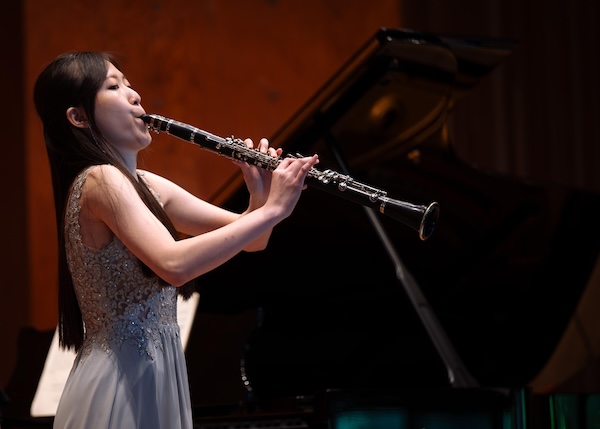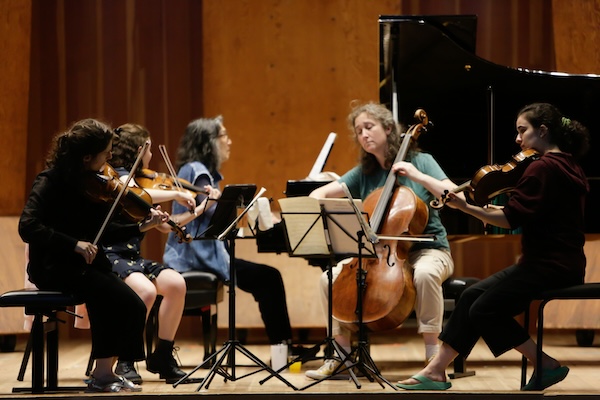A galaxy of rising chamber stars orbits around Uchida at Marlboro Festival

Since the creation of the Marlboro Music Festival in 1951, it has served as a summer retreat for elite musicians. The remote campus of Marlboro College in southern Vermont’s Green Mountains has drawn chamber music devotees up the winding roads to Potash Hill, from the days of founding artistic director Rudolf Serkin and cellist Pablo Casals onward. Concerts, spread over several weekends in July and August, take place mostly in the rustic venue called Persons Auditorium, a wooden structure that once doubled as the college gymnasium.
Like the listeners, the cream of the world’s crop of young musicians flock to Marlboro as students largely due to the charisma of the chamber music archons who teach there. The titanic pianist Mitsuko Uchida, now 75 years old, has served as music director since 1999, first as co-director with Richard Goode until 2013, then on her own, and since 2018 as co-director with Jonathan Biss. She featured prominently in the festival’s three concerts this past weekend, nearing the end of her 26th season at the helm.
This summer tradition, now in its 74th season, recently faced its most serious existential challenge when in 2020 its host, Marlboro College, joined the wave of small liberal arts colleges shuttering across the United States. The campus was sold to an educational company, with an ill-fated plan to develop a new school there during the pandemic. After a year of uncertainty, Marlboro Music itself purchased the campus, ensuring the festival a permanent home.
The programming this summer reflects Uchida’s conservative leanings, with a classical and romantic core repertory augmented by a few contemporary selections. This focus remains in line with the festival’s quirky traditions, in that the programming for each week of concerts is not announced until a week before the performances happen. Listeners come from great distances, knowing the sort of concert they will hear, but without the details.
Two of the weekend’s standout performances came in Beethoven piano trios. First, on Friday night, Juho Pohjonen anchored a crystalline rendition of the composer’s Piano Trio No. 3. The Finnish pianist’s delicate touch and precisely calibrated rhythmic flexibility allowed the two younger string players room to place their own lines with collaborative ease. Violinist Oliver Neubauer gave a dreamy sense of contemplation to the distinctive violin cadenza at the start of the first movement. (The young violinist, the son of violist Paul Neubauer, won first prize at the Young Concert Artists competition last year.)
Minjoung Kim produced a burnished, oaky tone for the cello-centered variation of the second movement. Pohjonen’s devilish, scherzo-like right-hand flourishes belied the third movement’s designation as a Minuetto. All three musicians formed a tight, impeccably balanced ensemble in the fast-moving third and fourth movements, a testament to the amount of rehearsal together that the seven-week format of the festival allows.
At the end of Saturday’s concert came a near-equally accomplished rendition of Beethoven’s Piano Trio No. 6. Pianist Solomon Ge, violinist Leonard Fu, and cellist Alice Neary brought an introspective character to the contrapuntal opening, an enigmatic theme that returns throughout the first movement. At the keyboard, Ge stood out for the exactitude of his trills and passagework, always balancing his instrument’s sound with the string players in front of him.
It was Fu’s playing that really struck the ear, accurate and consistently in tune across all dynamics and ranges. In his training the young violinist has focused equally on historical performance practice, which bore noteworthy fruit in the dance-like third movement, articulated by Fu with graceful ease. The finale offered a welcome boost of energy to close out the evening.

What happened on the first half of Saturday’s concert, however, most typified the Marlboro experience. Uchida took the piano bench to accompany a single, ten-minute Schubert song, the somber “Grenzen der Menschheit,” with young bass-baritone Evan Luca Gray. Uchida leaned into the bleakness of the stark introduction to this setting of Goethe’s despondent poem on the limitations of vain humanity. Gray sustained the lugubrious tempo with a sumptuous legato tone and assiduous German diction, ending on a solid low E that sounded the depths of despair.
This startling opener led to another noteworthy performance by a young musician, clarinetist Yuhsin Galaxy Su. Slated to take up the post of second clarinetist with the San Francisco Symphony this fall, she proved the best part of a rendition of the Brahms Clarinet Quintet. Her true intonation, sparkling range of tone, and consummate control put her above the not always well-blended string quartet that shared the stage with her.
The ensemble clicked most memorably in a heart-rending interpretation of the slow movement. Violist Yuchen Lu and cellist Alice Neary partnered with Su to give the opening of this Allegretto ma non troppo a dark-hued serenity. In particular, Lu’s viola sang nobly in the Trio section, followed by a star turn in the fifth variation of the last movement.
Galaxy Su showed admirable range by opening Sunday’s concert with Hommage à R. Sch. by György Kurtág, a piece begun in the 1970s and completed in 1990. Joined by pianist Filippo Gorini and violist Hsin-Yun Huang, the clarinetist led a scrupulous performance of these five miniatures and longer sixth movement, alternately acerbic and surreal. At its disjointed conclusion, Su turned with a mallet toward the large bass drum, waiting next to her on stage like Chekhov’s proverbial gun, and struck the piece’s final note with ritual solemnity.
Time seemed to spiral even more with the piece that followed, Bartók’s String Quartet No. 6, played by violinist Joseph Lin, former primarius of the Juilliard String Quartet, violinist Anna Göckel, violist Samuel Rosenthal, and cellist Zlatomir Fung. The foursome played this complex, tragic work with such remarkable cohesion and folk music-inspired spontaneity that they should consider forming a permanent string quartet together. They would join the ranks of prominent ensembles formed at Marlboro, most notably the Guarneri Quartet, which came together here in 1964.
Evan Luca Gray, Yuhsin Galaxy Su, and Juho Pohjonen, among others, return August 9 to 11 to close out this summer’s festival. Uchida will preside as soloist over Beethoven’s Choral Fantasy with the Marlboro Festival Orchestra, a festival finale tradition begun by Rudolf Serkin. marlboromusic.org